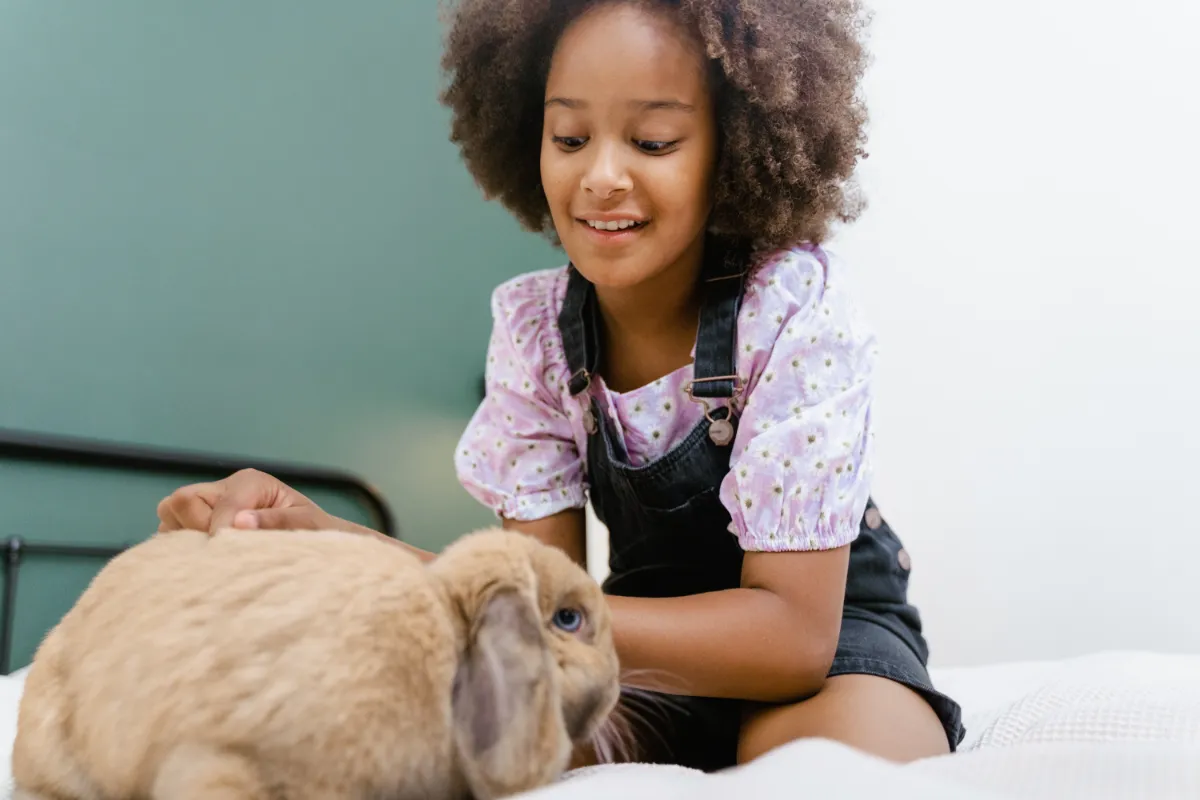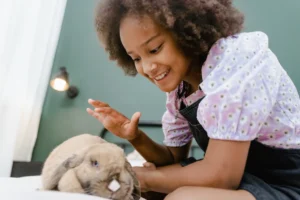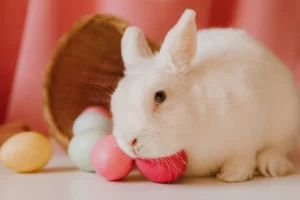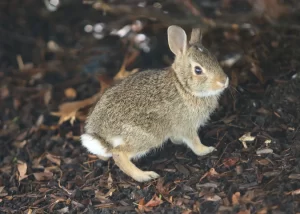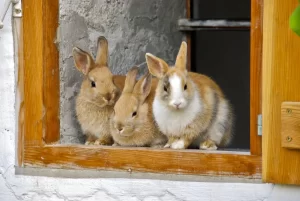Do you find yourself constantly chasing after your female rabbit as she runs circles around you? You’re not alone. In fact, studies show that many rabbit owners experience this behavior.
But why does it happen? In this article, we will delve into the instinctual behavior of female rabbits and explore the factors that contribute to their circle-running antics.
Armed with this knowledge, you’ll be better equipped to understand and address this behavior, ultimately strengthening the bond between you and your furry friend.
In This Article
- 1 Key Takeaways
- 2 Understanding the Instinctual Behavior of Female Rabbits
- 3 The Role of Play and Exercise in a Rabbit’s Life
- 4 Exploring the Bonding and Trust-Building Process With Your Rabbit
- 5 Environmental Factors That Contribute to Circle Running
- 6 The Influence of Hormones on Female Rabbit Behavior
- 7 How to Provide Mental Stimulation for Active Rabbits
- 8 Tips for Redirecting Circle Running Behavior
- 9 Seeking Professional Help: When to Consult a Rabbit Behaviorist
- 10 Frequently Asked Questions
- 10.1 How Do I Train My Female Rabbit to Stop Running in Circles Around Me?
- 10.2 Can Circle Running Behavior Be a Sign of a Health Issue in Female Rabbits?
- 10.3 Is There Any Specific Age Range When Female Rabbits Are More Likely to Exhibit Circle Running Behavior?
- 10.4 Are There Any Toys or Activities That Can Help Satisfy a Female Rabbit’s Need for Mental Stimulation and Prevent Circle Running Behavior?
- 10.5 Are There Any Specific Environmental Factors That Can Trigger Circle Running Behavior in Female Rabbits?
- 11 Conclusion
Key Takeaways
- Female rabbits have a strong natural instinct to run in circles.
- Diet can impact a rabbit’s behavior, and a diet lacking essential nutrients can lead to restlessness and increased activity.
- Providing mental stimulation through toys and ample space can satisfy a rabbit’s natural instincts.
- Hormones significantly impact a female rabbit’s behavior, and hormonal changes during the reproductive cycle affect mood and reproductive instincts.
Understanding the Instinctual Behavior of Female Rabbits
Do you understand why your female rabbit exhibits such instinctual behavior?
Female rabbits have a strong natural instinct to run in circles, and it’s important to comprehend why they engage in this behavior. Understanding the natural instincts of your rabbit can help you provide the best care and environment for her.
One factor that can impact your rabbit’s behavior is her diet. A diet that lacks essential nutrients can lead to restlessness and increased activity. Ensure that your rabbit’s diet consists of a balanced mix of hay, fresh vegetables, and high-quality pellets to meet her nutritional needs.
Additionally, providing mental stimulation through toys and ample space to explore can help satisfy her natural instincts. By understanding the impact of diet on your female rabbit’s behavior, you can create a fulfilling environment for her.
The Role of Play and Exercise in a Rabbit’s Life
Playing and exercising are essential for keeping your rabbit happy and healthy. Rabbits are naturally energetic animals and need plenty of physical activity to maintain their well-being. Playtime not only provides mental stimulation but also allows rabbits to burn off excess energy, reducing the risk of behavioral issues and obesity.
Regular exercise is crucial for maintaining healthy weight, preventing muscle atrophy, and improving cardiovascular health. Additionally, play and exercise can help manage excessive energy in rabbits, preventing destructive behaviors such as digging and chewing.
By engaging in interactive play sessions and providing opportunities for exploration, you can ensure that your rabbit’s physical and mental needs are met. Remember to provide a safe and enriching environment, and consult with a veterinarian for specific exercise recommendations for your rabbit’s breed and age.
| Benefits of Play and Exercise | Tips for Managing Excessive Energy |
|---|---|
| 1. Mental stimulation | 1. Provide plenty of toys and tunnels for your rabbit to explore and play with. |
| 2. Physical fitness | 2. Create a designated play area where your rabbit can exercise safely. |
| 3. Weight management | 3. Engage in interactive play sessions with your rabbit using toys and treats. |
| 4. Behavioral prevention | 4. Consider providing opportunities for supervised outdoor playtime, if appropriate for your rabbit’s breed. |
Exploring the Bonding and Trust-Building Process With Your Rabbit
Building a strong bond with your rabbit involves patience, consistency, and trust. When it comes to bonding techniques and building trust with your furry friend, there are a few key strategies to keep in mind:
- Spend quality time together: Regularly set aside time to interact with your rabbit, whether it’s through gentle petting, grooming, or simply sitting quietly nearby. This helps establish a sense of familiarity and comfort.
- Respect their personal space: Rabbits are naturally cautious creatures, so it’s important to give them the space they need to feel safe. Avoid forcing physical contact or overwhelming them with loud noises or sudden movements.
- Use positive reinforcement: Reward your rabbit’s good behavior with treats and praise. This encourages them to associate positive experiences with you and helps build a foundation of trust.
- Be consistent and predictable: Stick to a routine when it comes to feeding, playtime, and handling. This helps your rabbit feel secure and allows them to anticipate what to expect from you.
Environmental Factors That Contribute to Circle Running
You can minimize circle running in your rabbit by providing a spacious and stimulating environment, as well as enriching their surroundings with toys and tunnels. Rabbits often exhibit circle running behavior due to various reasons, including cage size and lack of socialization.
A small cage can restrict their movement and lead to frustration, resulting in excessive running in circles. It is essential to provide a cage that is large enough for your rabbit to stretch, hop, and explore.
Additionally, socialization plays a crucial role in reducing circle running tendencies. Interacting with your rabbit regularly and introducing them to other rabbits can help alleviate boredom and provide mental stimulation.
To understand the impact of cage size and socialization on circle running behavior, let’s take a look at the following table:
| Factors | Impact on Circle Running Behavior |
|---|---|
| Cage Size | Restricts movement and leads to frustration |
| Socialization | Reduces boredom and provides mental stimulation |
The Influence of Hormones on Female Rabbit Behavior
Hormones can significantly impact a female rabbit’s behavior, affecting their mood and reproductive instincts. Understanding the influence of hormones on your female rabbit’s behavior is essential for providing proper care and ensuring their well-being.
Here are four key ways in which hormones can affect your rabbit’s behavior and reproductive cycle:
- Estrus behavior: Hormonal changes during the reproductive cycle can cause your rabbit to exhibit signs of being in heat, such as increased vocalization and restlessness.
- Nesting instincts: As part of their reproductive cycle, female rabbits may develop strong nesting instincts, leading them to dig and rearrange their environment.
- Aggression: Hormonal fluctuations can also make your rabbit more territorial and prone to aggressive behavior, especially towards other rabbits.
- Mood changes: Just like humans, rabbits can experience mood swings due to hormonal changes, which may lead to changes in their overall behavior.
How to Provide Mental Stimulation for Active Rabbits
To keep your active rabbit mentally stimulated, try introducing puzzle toys or tunnels into their environment.
Rabbits are intelligent animals that require mental stimulation to prevent boredom and promote their overall well-being. Puzzle toys, such as treat balls or interactive feeding toys, provide mental challenges for rabbits to figure out how to retrieve their food. These toys not only engage their minds but also encourage physical activity as they hop and play with them.
Tunnels, on the other hand, offer a safe and stimulating environment for rabbits to explore and hide in. They can provide hours of entertainment as rabbits run through them, pop out unexpectedly, and engage in playful behaviors.
Tips for Redirecting Circle Running Behavior
Don’t worry, there are effective ways to redirect your rabbit’s circle running behavior. It can be frustrating when your furry friend constantly runs circles around you, but with the right training techniques, you can help them break this habit.
Here are four tips to get you started:
- Provide mental stimulation: Engage your rabbit’s mind by offering puzzle toys, hiding treats, or creating an obstacle course. This will help redirect their energy and keep them entertained.
- Increase exercise: Ensure your rabbit gets plenty of physical activity. Provide them with a safe and spacious area to roam, and consider adding tunnels or ramps to encourage exploration.
- Positive reinforcement: Reward your rabbit whenever they engage in desired behaviors, such as sitting calmly or coming when called. This will encourage them to repeat these actions instead of running in circles.
- Seek professional guidance: If your rabbit’s circle running behavior persists or worsens, consult a veterinarian or an experienced rabbit trainer for personalized advice and guidance.
Seeking Professional Help: When to Consult a Rabbit Behaviorist
If your rabbit’s circle running behavior persists or worsens, it’s important to occasionally seek professional help and consult a rabbit behaviorist. While some circle running can be a normal behavior for rabbits, excessive or constant circling could indicate an underlying issue that needs to be addressed. Seeking the assistance of a rabbit behaviorist can provide valuable insights into your rabbit’s behavior and help you find effective ways to manage or resolve the issue.
In the table below, we highlight some situations where consulting a rabbit behaviorist would be beneficial:
Situations When to Consult a Rabbit Behaviorist
- Your rabbit’s circle running behavior is causing injury to themselves or others
- The behavior is accompanied by other concerning symptoms such as loss of appetite or aggression
- Previous attempts to redirect or modify the behavior have been unsuccessful
A rabbit behaviorist has the expertise and experience to thoroughly assess your rabbit’s behavior and provide personalized advice and strategies to address any underlying issues. Remember, seeking help from a professional can greatly improve your rabbit’s overall well-being and strengthen the bond between you and your furry friend.
Frequently Asked Questions
How Do I Train My Female Rabbit to Stop Running in Circles Around Me?
To train your female rabbit to stop running in circles around you, try using positive reinforcement techniques such as clicker training and rewards. Avoid chasing or punishing your rabbit, as this can reinforce the behavior.
Can Circle Running Behavior Be a Sign of a Health Issue in Female Rabbits?
Circle running behavior in female rabbits can be caused by various behavioral factors, such as boredom or a need for exercise. However, it is important to rule out potential health concerns, like vestibular disease or spinal issues.
Is There Any Specific Age Range When Female Rabbits Are More Likely to Exhibit Circle Running Behavior?
The possible reasons for a female rabbit to exhibit circle running behavior can vary, but it is important to provide a safe and stimulating environment to prevent it.
Are There Any Toys or Activities That Can Help Satisfy a Female Rabbit’s Need for Mental Stimulation and Prevent Circle Running Behavior?
To prevent your female rabbit from running circles around you, provide toys and activities that offer mental stimulation. Engage her with puzzle feeders, tunnels, and interactive toys to keep her entertained and reduce the urge to circle run.
Are There Any Specific Environmental Factors That Can Trigger Circle Running Behavior in Female Rabbits?
Specific environmental factors such as a poor diet or lack of socialization can trigger circle running behavior in female rabbits. Pay attention to their diet and make sure they have plenty of social interaction to prevent this behavior.
Conclusion
In conclusion, your female rabbit’s circle running behavior is a fascinating display of her instinctual nature and need for exercise. By understanding the various factors that contribute to this behavior, such as play, bonding, hormones, and environmental stimulation, you can provide a fulfilling and mentally engaging life for your furry companion.
Remember, seeking professional help when needed ensures that you can address any concerns and continue to strengthen your bond with your rabbit.
So, embrace the whirlwind of energy and enjoy the mesmerizing dance of your rabbit’s circles!

